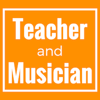In this eighth music education reading roundup, there’s a sense of the pressures of our time. Two...
Reading highlights 3
Here’s my latest roundup of music education reading from the various corners of the internet. There’s a bit of an international theme this week with articles looking at both Ireland and Australia. The theme also seems to have centred on both the purpose of music education and the ‘side-benefits’ of it as we look at character education and ‘cognitive capacity’.
Leah Govier: Castle Rock High School Music Maestros
I’ve recently started working with Music Mark on developing their Peer to Peer Network and it’s been a pleasure to see some great new blog posts and discussions taking shape there. It’s well worth having a read through some of the archives here. In particular, it was great to read about the work that Leah Govier has been doing at Castle Rock High School to get every pupil in Year 8 learning and instrument with dedicated tutors.
This sounds like an absolutely fantastic initiative that’s putting music at the very heart of school culture, which links into the discussion we had in last week’s MufuChat. I’m hoping that Leah will continue to blog about the impact this project has on this year group’s future music learning.
Kim Bielenberg: Why it’s time to fine-tune music education in all our schools
The ‘EBacc for all’ rule, requiring all pupils to be entered for EBacc subjects, has caused something of an uproar in England, so it is interesting to read this piece about music education in Ireland’s schools. Music is on the rise as a secondary school subject but provision is patchy at primary school level. The following sentence will be familiar to music teachers on this side of the Irish Sea:
The things that tend to fall by the wayside are the arts. If teachers have to spend more time on certain subjects, they will have to dispense with others. The Arts tend to be treated as the poor cousins.
It’s interesting to note that Irish music provision is facing similar problems to the UK but with the significant difference that an increasing number of Leaving Certificate pupils are studying music. That’s a stark difference to the likely impact of the EBacc on music at Key Stage 4, which brings me on to…
Michael Griffin: Music education for character education
The current focus on character education is one that bemuses me somewhat. With all the focus on systems, measurement and results it can be hard to see where character fits in. It confuses me further that the EBacc focuses so narrowly on a few subjects but then leaves out those that are so obviously central to building character. Why not focus on breadth of study to achieve the same result without raising a random group of subjects to a higher level?
This makes Michael Griffin’s look at the history of music education and character education seem really quite relevant. Looking at great philosophers and their comments about the importance of music in building character, it makes me wonder why we seem to need to rediscover this.
Anita Collins: Music education key to raising literacy and numeracy standards
After last week’s round-up, where Peter Greene talked of his irritation at people defending music education by mentioning it’s benefits in other subjects, it’s interesting to read Anita Collins’ discussion of precisely that benefit. She makes the case that music can build the cognitive capacity to improve the number of learners who go on to study STEM subjects at university. Hopefully, this wouldn’t be the only objective here (presumably, STEAM subjects would all benefit rather than just STEM…) and Michael Griffin’s talk of character education may be equally well served.

